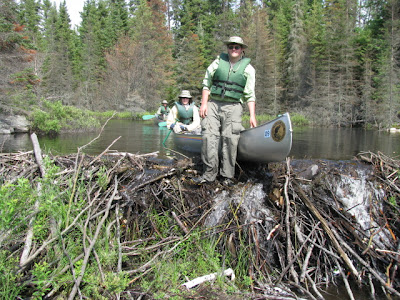In all of my other travels, I haven’t ever felt like I was part of where I was. I found it very humbling, sitting in a canoe in the Canadian wilderness. On the American side, it called the Boundary Waters Canoe Area Wilderness. The Canadian side is Quetico Provincial Park. I had been to this area twice before, but each time was just as awe-inspiring as the first. The first time I went I was young and hadn’t ever been on a trip like this before. I was carefree and oblivious. By my third trip, I was more prepared. I had experience; I knew what to do and how to do it.
We flew to Minneapolis/St. Paul and drove to Ely, passing through fields and forests. In Ely we got our canoes and our packs, full with eight days of food. We paddled in lakes so big you couldn’t see from one shore to the other. On days it rained we paddled hard, desperate to hit land and make fire and put on dry socks. On windy days the lakes would get choppy and threaten to tip us over.
On my first trip, the waves would get big and I’d hop up and down in my seat, lifting the canoe over one wave and cutting it through the next until my dad told me to stop. On my third trip, one canoe got anxious and started heading for the rougher waters by the shore, waves rebounding off rocks and rolling back into other waves. I remained in the middle of the lake and headed for calmer waters sitting behind an island. We had the wind at our backs after that and we paddled to the portage. Later, my dad would say that my decision was probably the best in that situation.
We ate oatmeal for breakfast, tearing open the pouch and pouring it directly into our mouths. We drank Kool-Aid the same way. Lunches and dinners were advertised as beef stroganoff or chicken a la king, but could also have been called rice and meat. We would fish on the days we didn’t travel, taking the canoes out to the middle of the lake and hoping to catch some real food. On my first trip, we’d wade out into the lake with salami on fishing line and catch crayfish, careful not to let them pinch us. We put them in a pot as we caught them and boiled them later, pulling apart their red shells for the meat underneath. On my second trip, we found wild blueberries behind our campsite and picked the area clean. We’d scour every campsite for wild blueberries from then on.
We would canoe in lakes that were dammed by beavers, getting out to push our canoe over the logs and into the next section of the lake. We would float through channels standing in our canoes like gondoliers or wading alongside and guiding it around the bends. We swam in water so clear that we could see thirty feet down to the lake floor and we sat in our canoes by cliffs where someone had drawn antelope and moose or traced their hands centuries earlier. We were immersed in nature.
I cannot articulate exactly how Quetico makes me feel, but this quote by John Muir comes pretty close: “Walk away quietly in any direction and taste the freedom of the mountaineer. Camp out among the grasses and gentians of glacial meadows, in craggy garden nooks full of nature's darlings. Climb the mountains and get their good tidings, Nature's peace will flow into you as sunshine flows into trees. The winds will blow their own freshness into you and the storms their energy, while cares will drop off like autumn leaves. As age comes on, one source of enjoyment after another is closed, but nature's sources never fail.”
Travis is slowly accepting that his writing can be good and rarely turns things in on time. You can read his blog at http://www.travismaybe.tumblr.com and if you ask, he may let you read his tweets at http://www.twitter.com/maybetravis
{Photo by Jay Light}





















































